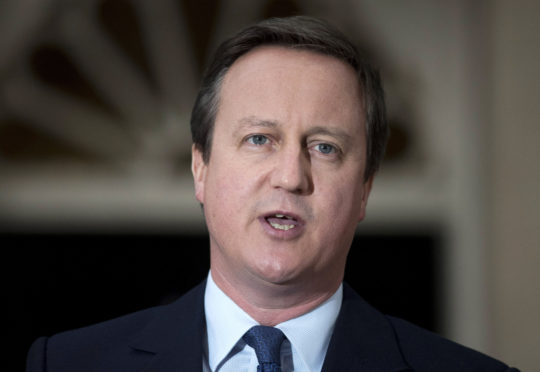
David Cameron describes Alex Salmond as “the slipperiest of characters” as he details the run-up to the Scottish independence referendum in his Downing Street memoirs.
The former Prime Minister, recounting talks with the former FM before the 2014 poll, said “you had to count your fingers on the way out of a meeting”.
He also claimed in an extract from his autobiography that negotiations for holding an independence referendum dragged on and that Salmond’s plan was to “use the failure to get a deal as yet another argument for independence”.
Two chapters in Cameron’s memoir For The Record, for which he was paid £800,000, cover the Scottish independence referendum in 2014.
In extracts published in the Sunday Times today, he writes the growing popularity of the SNP and its support for independence had put Scotland at the “top of the agenda” by 2011.
A referendum was a massive gamble but thwarting one would be an even bigger gamble, writes Cameron, adding: “The sense of grievance against a distant, out-of-touch Westminster government would only grow.”
Negotiations opened after George Osborne began speaking to former Labour Chancellor Alistair Darling about an anti-independence campaign. Cameron notes: “I went up to Edinburgh for my first negotiation meeting with the slipperiest of characters, Alex Salmond, Scotland’s first minister, in February 2012.
“I always used to say you had to count your fingers on the way out of a meeting with him. The negotiations dragged on – at one point it really seemed the referendum wasn’t going to happen, and that his plan was to use the failure to get a deal as yet another argument for independence.
“But by October it was back on and, during a short meeting at Salmond’s office in St Andrew’s House, we signed the agreement.”
Last night, Mr Salmond hit back, saying the extracts showed how “rattled” the former PM had been during the indyref campaign, “lying awake at night worrying about what the Queen would think of him if there was a Yes vote.”
The former SNP leader added: “In reality, David wasn’t a great negotiator and the Scottish side achieved most of what we wanted from the Edinburgh Agreement of 2012, hence his petulance.”
The pro-Union Better Campaign, privately dubbed Project Fear, has been criticised as being too negative but Cameron writes: “If the frame of reference was love for Scotland, that would push undecided voters towards voting yes, not no. What brought them to no was the undeniable fact that no was safe and yes was risky.”
Cameron was at Balmoral, the Queen’s official residence in Scotland, two weeks before the referendum when a newspaper opinion poll showed the Yes side in the lead for the first time. Cameron writes: “The Queen wasn’t there, she usually had breakfast alone.
“Instead, I was surrounded by ladies-in-waiting, equerries and the moderator of the Church of Scotland. I tried to reassure them about ‘rogue polls’, but I was struggling to convince myself, let alone them. One week later, however, the Queen spoke to some of those gathered outside Crathie Kirk and said she hoped Scots would ‘think very carefully’ about the vote. I was delighted.”
Cameron says there was “panic” in the No camp after the polls for the independence referendum closed when a turnout of 85% was declared, higher than for any election in UK history. He was later criticised for announcing an English Votes For English Laws policy outside No.10 as he welcomed Scots voting 55-45% to keep the Union.
In an interview to launch the first extracts of his memoirs, Cameron said he regretted the result of European referendum and said he would not rule out another poll.
However, the former PM was accused last night of “brazen hypocrisy” by SNP deputy leader Keith Brown. He said: “In 2014 the people of Scotland were promised by the likes of David Cameron that a ‘No’ vote meant Scotland would be an equal partner in a UK in the EU.
“That promise has been destroyed by his Brexit referendum policy that was solely based on trying to stop Tory party splits. It’s brazen hypocrisy for him to stand against the right of the people of Scotland to decide their own future.”

Enjoy the convenience of having The Sunday Post delivered as a digital ePaper straight to your smartphone, tablet or computer.
Subscribe for only £5.49 a month and enjoy all the benefits of the printed paper as a digital replica.
Subscribe